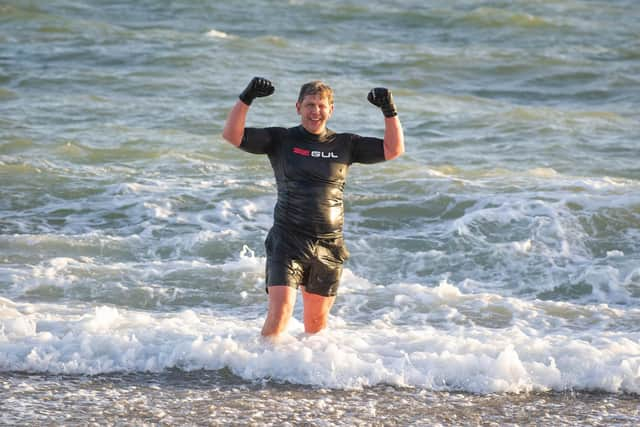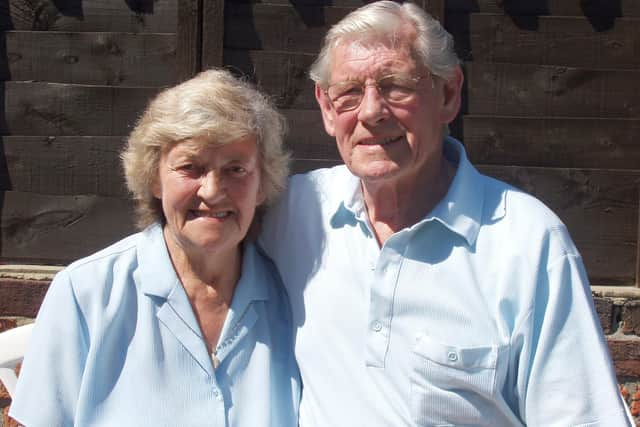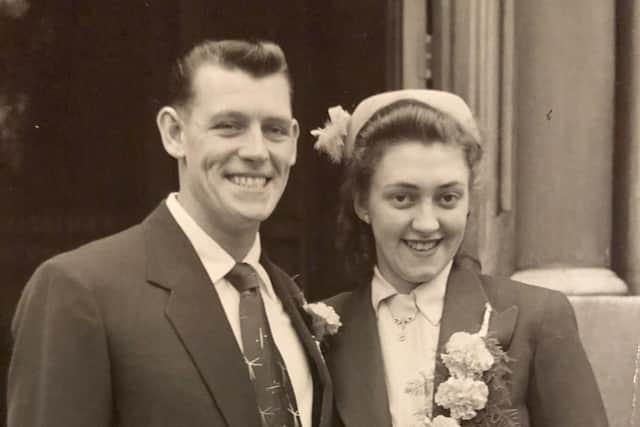How sea swims helps this Milton man grieve after losing both parents in 2020
and live on Freeview channel 276
Within the space of four months, both his mum and dad died.
What followed for Grant were months of grieving and understandable sadness. He felt like he was drowning in heartache, but it was actually the sea and swimming which has helped him deal with his emotions.
Advertisement
Hide AdAdvertisement
Hide AdGrant, 56, says: ‘Sea swimming made me completely switch off from everything while I was grieving for my mum and dad. It’s a good release.’


The Milton man has now challenged himself to endure 28 cold-water swims during the 28 days of February to raise money for Dementia UK – the charity helping to fight the degenerative disease he lost his mum to.
‘My mum, Marion, died in Harry Sotnick House care home in March 2020,’ explains Grant.
‘She was diagnosed with dementia 15 years ago and 10 of those were spent in a care home. She was 87 when she died.
Advertisement
Hide AdAdvertisement
Hide Ad‘My dad was really looking forward to their retirement together and after my mum was diagnosed, he spent five years being her full-time carer. The stress of caring for her took a toll on my dad, Ron, and that’s when we decided to move her to a care home.’


Although Marion then lived a 20-minute walk from his home, Ron visited her every day of the week. Grant says: ‘When the pandemic struck, he would stand outside her window.
‘He would go every day apart from one day at the weekend when he enjoyed watching the races and putting a few bets on. He would never bet more than 50p.
‘When my mum died last year in March, it broke my dad’s heart. They had six boys and were together for nearly 70 years.’
Advertisement
Hide AdAdvertisement
Hide AdIf losing a wife and mother was not awful enough, the scale of the pandemic was only just unfurling which meant Marion’s funeral was limited.


‘There are three of us boys still living in Portsmouth and because I lived just round the corner from dad, I would go and see him a lot,’ says Grant, who works as a builder and renovator.
‘We had some great conversations. He told me he wished he had been a long-distance runner, something I never knew before.
‘My dad was as bright as a button.’
A few months before Marion died, Ron had been admitted to Queen Alexandra Hospital, Cosham, in December 2019 with pneumonia.
‘He was on a ventilator for three weeks,’ explains Grant.
Advertisement
Hide AdAdvertisement
Hide Ad‘However, he came out of hospital and seemed okay until he died at the end of June 2020. His death certificate declared COPD.’
In the space of a few months, Grant’s world was turned upside down.
His parents were gone and while the mental effects of the pandemic were starting to be felt universally, Grant was on the hunt for a release and a chance to clear his head.
He says: ‘A friend of mine started sea swimming and encouraged me to go along too in early July and I loved it.
Advertisement
Hide AdAdvertisement
Hide Ad‘I have been doing it nearly every day since. I normally go after work but joined the 8am swimmers at South Parade Pier when it was allowed.
‘ It was exhilarating and an escape from daily life.
‘When you’re so cold, you start to focus on just moving and swimming. You can’t think about anything else.’
Cold-water swimming is noted to have many benefits. Among them is a boosted immune system; better blood circulation; reducing stress as well as giving a natural high by activating endorphins.
However, with more research, Grant discovered cold-water swimming may protect the brain from degenerative diseases like dementia.
Grant explains: ‘I couldn’t believe it.
Advertisement
Hide AdAdvertisement
Hide Ad‘There is always a question whether I may have a higher chance of getting dementia too because my mum had it. ‘
According to research done by Cambridge University in 2020, a ‘cold-shock’ protein was found in individuals who regularly swam in the winter months. This protein has been shown to slow the onset of dementia and even repair some of the damage it causes in mice.
Professor Giovanna Mallucci – who runs the UK Dementia Research Institute's Centre at the University of Cambridge – said this breakthrough could point scientific research towards treatments which could help reduce the chance of having dementia, however developments are still at an early stage.
‘It felt very weird that the hobby I had taken up could actually prevent the disease which had caused me so much pain to begin with,’ adds Grant.
Advertisement
Hide AdAdvertisement
Hide AdWhen Grant kicked off his 28 swims in 28 days challenge at the beginning of February, he set his fundraising target at £200. Today, he has raised more than £1,600 for Dementia UK, which provides nurses to work alongside families like his with one-to-one support, expert guidance and practical solutions.
‘When I decided to do a fundraiser, I wanted to support a charity which was so close to home,’ says Grant.
‘It’s an amazing feeling to raise such a great amount of money and knowing so many people are encouraging me.
‘I have realised through this fundraiser that a lot of people have gone through a similar thing. Their stories and memories have been very helpful to me.’
Advertisement
Hide AdAdvertisement
Hide AdWith only five days to go until the end of his challenge, Grant does not plan to give up sea swimming any time soon. He admits he has done the hard bit by motivating himself to run into the waves in freezing temperatures during winter months and spring is just around the corner, but stresses safety is very important.
‘I have been going regularly since July so don’t recommend people to go into the water when it’s cold for a long period of time because you could put yourself in danger.
‘I normally go in for about 10-30 minutes depending on the temperature. When it was nearly snowing last week, I wasn’t in for that long at all. You have to be sensible.’
But whether it’s swimming, running or walking, Grant says exercise is good for the brain and clears your thoughts. ‘If you’re physically able to, I strongly encourage people to get out. Even if it’s for a walk, fresh air is so good for you.
To support Grant and donate to his fundraiser for Dementia UK, go to uk.gofundme.com and type in the search bar ‘28 swims in 28 days’.